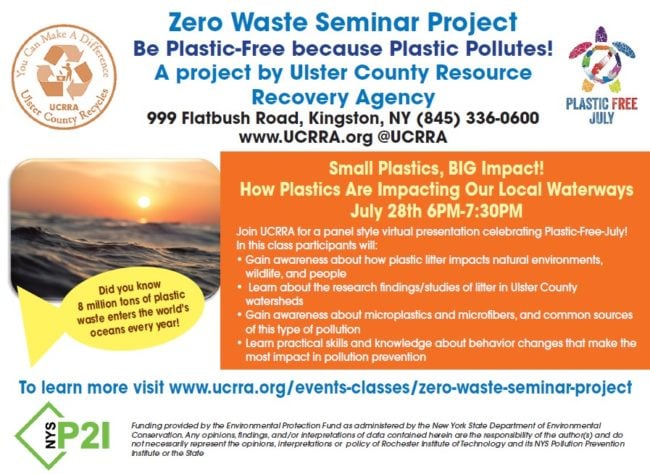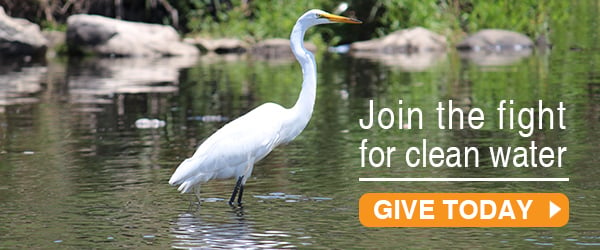Small Plastics, Big Impact: How Plastics are Impacting our Local Waterways

- When:
- July 26, 2021: 6:00PM to 7:30PM
- Where:
- Online
- To Attend:
- Register to attend

It’s estimated that every year, 8 million metric tons of plastic waste enters the world’s oceans! Researchers believe that much of this plastic pollution comes from litter in our environment. Emerging science also shows that microplastics and microfibers from our clothing are contributing to marine plastic and water pollution. In this FREE workshop, UCRRA celebrates Plastic Free July and the UCRRA Zero Waste Seminar with a panel discussion about the cause and effects of plastic pollution on our local water systems and what we can do to protect our rivers, streams, and watersystems from plastic pollution.
Speakers:
- Jen Benson, Volunteer & Outreach Coordinator, Riverkeeper
- Andrea Varga, Associate Professor of Design/Sustainability at School of Fine & Performing Arts, SUNY New Paltz
Moderator:
- Angelina Peone, Director of Sustainability at Ulster County Resource Recovery Agency
The UCRRA Zero Waste Seminar Project aims to raise community awareness about the impact of waste reduction as a form of pollution prevention. We join the growing community concerned about the effects of plastic on wildlife, human health, our communities, our climate, and our watershed. Join UCRRA in celebrating Plastic-Free-July and pledge to be plastic-free, because plastic pollutes!
The UCRRA Zero Waste Seminar Project will call on our community members to rethink waste through zero waste practices, resulting in improved public health and environmental conservation. ‘Zero waste’ living is a lifestyle that drastically reduces the amount of garbage we make on a daily basis. Simple choices, habits, and behaviors can make a huge difference! Through innovative education and community engagement, participants in our webinar series will learn new skills and practices about zero waste concepts, gain knowledge about the waste-climate connection, and help to build a culture of pollution prevention in Ulster County.
The Zero Waste Seminar is a community engagement project by the Ulster County Resource Recovery Agency, celebrating Plastic Free July and the many ways we can prevent pollution from our waste. Funding provided by the Environmental Protection Fund as administered by the New York State Department of Environmental Conservation. Any opinions, findings, and/or interpretations of data contained herein are the responsibility of the author(s) and do not necessarily represent the opinions, interpretations or policy of Rochester Institute of Technology and its NYS Pollution Prevention Institute or the State.

